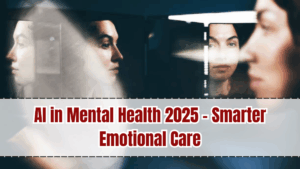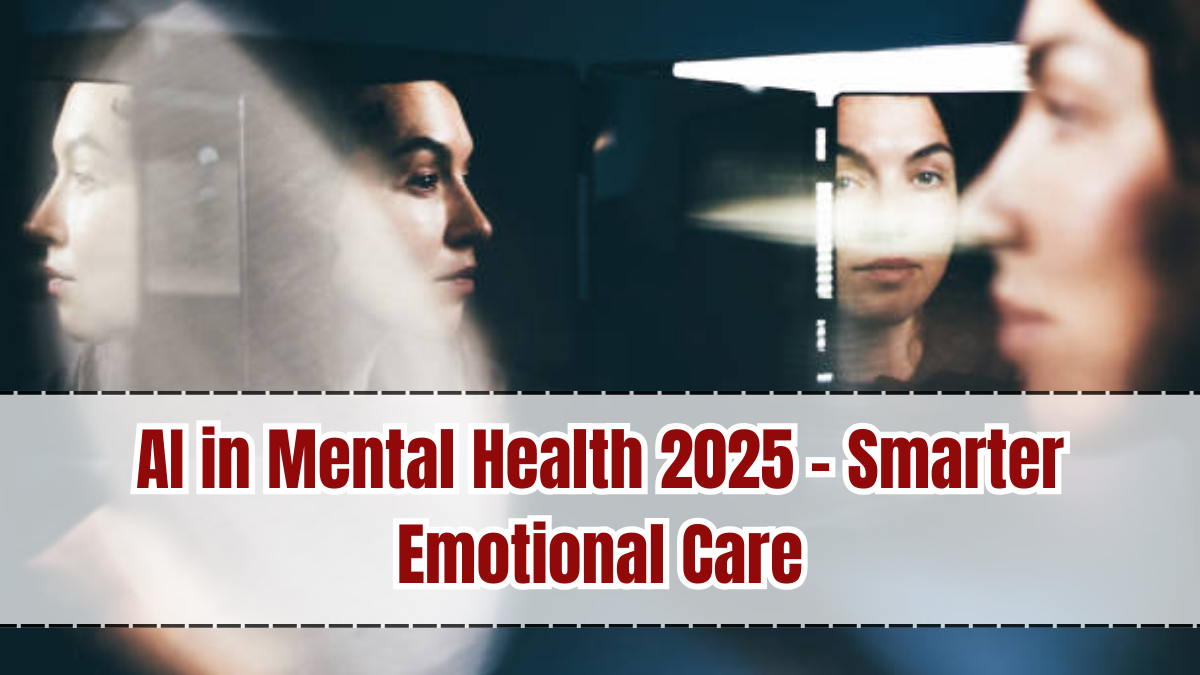Mental health has become one of the most pressing challenges of modern society. Stress, anxiety, and depression are affecting millions of people worldwide, often with limited access to professional help. In 2025, AI in Mental Health is offering smarter, more accessible solutions. From AI-powered therapy chatbots to wellness apps, technology is making emotional care available anytime, anywhere, helping people manage mental health in new and effective ways.

What is AI in Mental Health?
AI in Mental Health refers to the use of artificial intelligence technologies to support emotional well-being and mental healthcare. These tools analyze speech, text, and behavioral patterns to identify stress, mood changes, or signs of mental illness.
Key features include:
-
AI therapy chatbots for daily conversations and support.
-
Emotion-tracking apps using voice and facial recognition.
-
Personalized mental health plans based on data analytics.
-
AI-powered meditation and mindfulness guidance.
-
Virtual platforms connecting users with human therapists when needed.
Why It Matters in 2025
The importance of AI in Mental Health 2025 lies in its accessibility. Many people avoid therapy due to stigma, cost, or lack of available professionals. AI tools provide anonymous, affordable, and immediate support. They also help in early detection, allowing individuals to seek professional help before issues become severe. In regions with limited healthcare infrastructure, AI is becoming a crucial bridge to emotional wellness.
Benefits of AI in Mental Health
AI-driven tools provide multiple benefits to individuals and healthcare systems:
-
Accessibility: Available 24/7, regardless of location.
-
Affordability: Cheaper than traditional therapy sessions.
-
Early Detection: Identifies symptoms before they worsen.
-
Personalization: Tailors coping strategies to individual needs.
-
Reduced Stigma: Provides discreet support without judgment.
These benefits make AI an essential partner in global mental health care.
Role of Technology
Technology powers innovation in emotional care. Natural Language Processing (NLP) allows chatbots to understand and respond empathetically to user concerns. Machine learning models analyze behavioral data from wearables, such as sleep patterns and heart rates, to predict emotional distress. Virtual reality (VR) is being used for exposure therapy, while AI-driven apps provide guided meditation and stress management. Together, these technologies make emotional care both proactive and responsive.
Government and Industry Initiatives
Governments and health organizations are recognizing the value of AI in mental health. Public health programs are integrating AI apps into community healthcare systems. Insurance providers are covering AI-based therapy tools as part of wellness plans. Startups and tech giants alike are investing heavily in research, focusing on responsible AI that prioritizes privacy and ethical care. These initiatives ensure that technology complements, rather than replaces, human therapists.
Future of AI in Mental Health
By 2030, AI will play an even deeper role in mental health care. Advanced algorithms may predict mental health risks weeks in advance, based on lifestyle and biometric data. AI-driven avatars could provide realistic virtual therapy sessions, while integration with smart homes may allow real-time mood tracking and intervention. Ethical AI will ensure that these systems remain supportive, empathetic, and safe for users.
Conclusion
AI in Mental Health 2025 is changing the way emotional well-being is approached. By providing accessible, affordable, and personalized care, AI is ensuring that mental health support reaches those who need it most. While it will never replace the role of human empathy, AI acts as a valuable companion, empowering individuals to take control of their emotional health. The future of mental care is not just digital—it is compassionate, smart, and inclusive.
FAQs
What is AI in Mental Health 2025?
It refers to AI-powered tools and apps that support emotional well-being through therapy chatbots, emotion tracking, and personalized care.
How do AI tools help with mental health?
They provide 24/7 support, early detection of issues, and personalized coping strategies.
Are AI therapy chatbots reliable?
They are effective for initial support and daily check-ins but are designed to complement, not replace, professional therapists.
Do AI apps protect user privacy?
Yes, most follow strict data privacy regulations, though ethical use remains a priority in ongoing development.
What is the future of AI in mental health?
Future systems will include predictive care, VR-based therapy, and deeply personalized mental health ecosystems.
Click here to know more.
